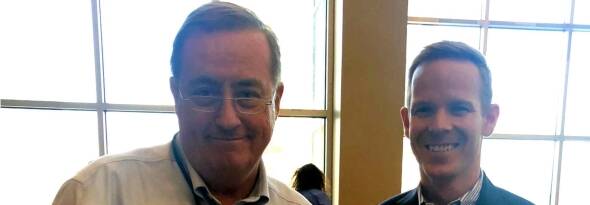When the top research award is announced at the American Association of Bioanalysts (AAB) every year, it’s a pretty good bet an embryologist or In Vitro Fertilization (IVF) laboratory director will be called to receive the honor – fertility doctors seldom win the prize.
But RMA turned heads last month in New Orleans when first-year fellow Dr. Brent Hanson won first place at the annual AAB meeting. While it wasn’t the first time a fertility doctor, or an RMA doctor, have won the top honor – RMA’s Dr. Jason Franasiak and Dr. Scott Morin have both won – it was a significant win for Dr. Hanson, who will begin his second year in fellowship with RMA next month.
“It was exciting to present this research and very flattering to win,” said Dr. Hanson, a Wisconsin native who completed his OB/GYN residency at The University of Utah.
His winning research revolved around an important question: if a group of embryos coming from the same patient has some normally-developing embryos and some slowly-developing embryos, will the normally-developing embryos in that group have higher rates of aneuploidy compared to another group of embryos where all the embryos are normally-developing?
Dr. Hanson wanted to see if slowly-developing embryos, which previous research has shown have higher aneuploidy rates than normally-developing embryos, affected the other normally-developing embryos within their group.
“We wanted to check if the entire group was worse off if one or more of the embryos developed slowly,” he said.
Dr. Hanson’s research found the answer to be ‘no’ – both groups had similar rates of aneuploidy, or where embryos are deemed abnormal and not transferred because they are chromosomally-imbalanced.
“We found the normally-developing embryos in both groups to be of equal quality,” Dr. Hanson said, “meaning their rates of euploidy, or when embryos are considered chromosomally-balanced and normal, were equivalent.”
“This reaffirmed to us that embryos with normal development result in normal embryos most of the time, regardless if any other embryo in their group developed more slowly.”
To get to this conclusion, Dr. Hanson used a model to study euploidy and aneuploidy rates of embryos created at RMA between January 2017 and March 2019. The data was split into two groups based on the pattern of development within each cohort (the number of embryos made from one cycle with one patient).
Group 1 consisted of embryos that reached the blastocyst stage of development on day 5 or 6, considered normal, and day 7, considered slow. Group 2 consisted of embryos that reached the blastocyst stage only on day 5 or 6. The resulting data showed the euploid rate in the day 5 and 6 blasts in Group 1 was 56%, while the euploid rate in the day 5 and 6 blasts in Group 2 was 58.1%.
“That’s not a statistically significant difference,” Dr. Hanson said. “It showed that each embryo’s risk for aneuploidy appears to be independent of the other embryos made in the same cycle.”
The data did, however, add further evidence to existing knowledge that day 7 blasts tend to have lower rates of euploidy than day 5 or 6 blasts. Dr. Hanson’s research found the rate of euploidy in the day 7 blasts in Group 1 was only 40.6% – more than 15% lower than day 5 and 6 blasts in both groups.
So how common are day 7 blasts?
“They affect about 20% of the patient population,” Dr. Hanson said, “so it’s something that definitely interests us.”
“Our research helps us understand this population a little better, and is ultimately good news for patients with day 7 blasts in their cohort – they don’t have to worry about a domino effect.”
Dr. Hanson’s next research project will focus on male infertility, and by December, he’ll be moving into the next stage of his fellowship: learning the ins and outs of the embryology and andrology laboratories.
So far so good for this young doctor.
“It’s been a great first year here at RMA, with many opportunities for growth, research and patient connection,” he said. “I can’t wait to see what the next two years have in store.”
RMA is a worldwide leader in fertility science, committed to advancing the field one healthy baby at a time. To make an appointment with a fertility doctor, click here or call 973.656.2089.
